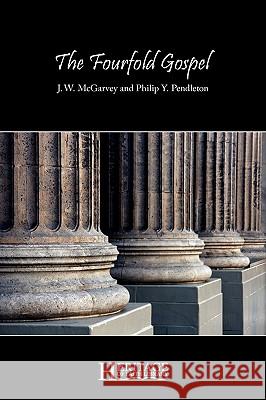The Fourfold Gospel » książka
The Fourfold Gospel
ISBN-13: 9781936341016 / Angielski / Miękka / 2010 / 510 str.
The Fourfold Gospel
ISBN-13: 9781936341016 / Angielski / Miękka / 2010 / 510 str.
(netto: 81,27 VAT: 5%)
Najniższa cena z 30 dni: 83,93
ok. 16-18 dni roboczych.
Darmowa dostawa!
The classic Harmony of the Gospels by J. W. McGarvey and Philip Y. Pendleton with interspersed comments. Attractively re-typeset, this enduring work is a valuable resource to modern Bible students. "In most commentaries a fifth or sixth of the space is taken up in drawing distinctions between the texts of the four Gospels, while in this work these distinctions are placed before the reader's eye, where he can see them for himself at a glance. Moreover, in other commentaries, which give the text, another sixth or seventh of the work is taken up in reprinting in the notes that portion of the text concerning which the commentator wishes to speak. Our interjected method avoids all this needless repetition, and makes it possible for us to present the comment with the least preliminary verbiage or introductory setting. Time is also saved because the reader does not have to look back and forth from the text at the top to the comment at the bottom of the page. Again, other commentaries lose a large amount of space by using the King James text. Those which preceded the revision waste space correcting the translation and modernizing its English: those published since the revision suffer a similar waste by drawing endless comparisons between the two texts. By choosing the American revision as the basis for our work, we have a text which needs but little explanation or apology, and we are thereby enabled to employ the reader's time and strength to his best advantage." --Excerpted from the Introduction
The classic Harmony of the Gospels by J.?W. McGarvey and Philip Y. Pendleton with interspersed comments. Attractively re-typeset, this enduring work is a valuable resource to modern Bible students."In most commentaries a fifth or sixth of the space is taken up in drawing distinctions between the texts of the four Gospels, while in this work these distinctions are placed before the readers eye, where he can see them for himself at a glance. Moreover, in other commentaries, which give the text, another sixth or seventh of the work is taken up in reprinting in the notes that portion of the text concerning which the commentator wishes to speak. Our interjected method avoids all this needless repetition, and makes it possible for us to present the comment with the least preliminary verbiage or introductory setting. Time is also saved because the reader does not have to look back and forth from the text at the top to the comment at the bottom of the page. Again, other commentaries lose a large amount of space by using the King James text. Those which preceded the revision waste space correcting the translation and modernizing its English: those published since the revision suffer a similar waste by drawing endless comparisons between the two texts. By choosing the American revision as the basis for our work, we have a text which needs but little explanation or apology, and we are thereby enabled to employ the readers time and strength to his best advantage."--Excerpted from the Introduction











